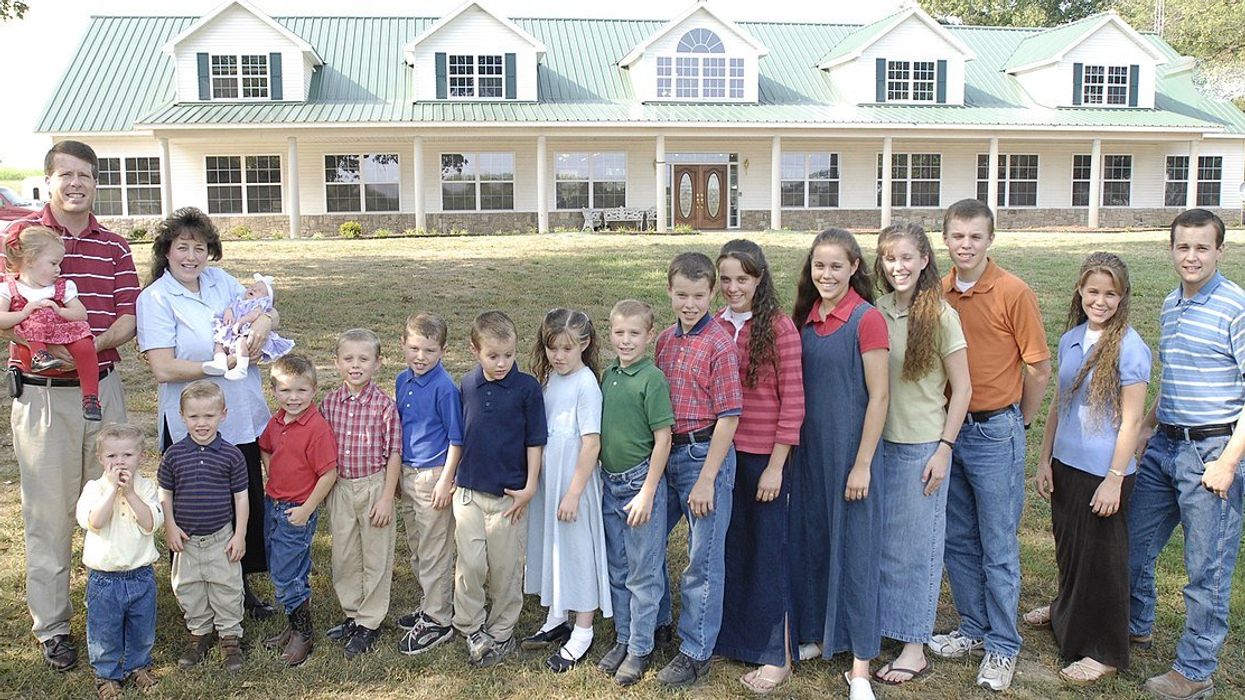
The Duggar family in 2007 (Wikimedia Commons)
December 19, 2024
ALTERNET
Far-right Christian nationalists have been aggressively promoting the "tradwife" movement, claiming that U.S. women are rejecting feminism in huge numbers, enthusiastically leaving the workforce and focusing exclusively on being wives and mothers.
But Salon's Amanda Marcotte, in a biting article published on December 19, argues that "tradwives" are nowhere near as plentiful as Christian nationalists claim they are — and that far-right promoters of a "tradwife" lifestyle are engaging in "silly online fantasy."
Online "tradwife" content, according to Marcotte, is "often interwoven with fundamentalist Christianity." And those "pushing back against" their "propaganda" include "feminists" and "critics of Christian nationalism."
READ MORE: 'We want retribution': Atlantic staffer warns MAGA is even more disturbing in-person
"The ubiquity of this content, especially on TikTok, has created widespread anxiety that this is a real-life trend of everyday women rejecting feminism for 'happy housewife' fantasies," Marcotte explains. "In the real world, however, women are not turning their backs on decades of women's progress. The data shows the opposite."
Marcotte continues, "More women than ever are embracing financial independence, delaying motherhood, and choosing single life over unsatisfactory relationships. Tradwifes are a silly online fantasy, and in many cases, overt propaganda."
The Salon journalist notes that according to a 2023 study from Pew Research, wives make as much money as their husbands — or more — in 45 percent of marriages.
Citing data from the U.S. Census Bureau, Pew and others, Marcotte observes, "About half of women are unmarried, which is a record high. Single women are more likely than single men to own their home. Single women without children have as much wealth on average as their male counterparts."
READ MORE: MAGA Republicans ramp up plan to 'indoctrinate' public schools with Christian nationalism
Marcotte adds, "Young women complete college at higher rates than young men, with 47 percent of women ages 25 to 34 having a bachelor's degree, compared to 37 percent of men that age. The birth rate has hit a record low, largely driven by the collapse in teen pregnancy rates. There's no real-world tradwife trend. It's better understood as an online fantasy, which attracts so much attention precisely because it's so foreign to people's lived experiences."
Amanda Marcotte's full Salon article is available at this link.
Far-right Christian nationalists have been aggressively promoting the "tradwife" movement, claiming that U.S. women are rejecting feminism in huge numbers, enthusiastically leaving the workforce and focusing exclusively on being wives and mothers.
But Salon's Amanda Marcotte, in a biting article published on December 19, argues that "tradwives" are nowhere near as plentiful as Christian nationalists claim they are — and that far-right promoters of a "tradwife" lifestyle are engaging in "silly online fantasy."
Online "tradwife" content, according to Marcotte, is "often interwoven with fundamentalist Christianity." And those "pushing back against" their "propaganda" include "feminists" and "critics of Christian nationalism."
READ MORE: 'We want retribution': Atlantic staffer warns MAGA is even more disturbing in-person
"The ubiquity of this content, especially on TikTok, has created widespread anxiety that this is a real-life trend of everyday women rejecting feminism for 'happy housewife' fantasies," Marcotte explains. "In the real world, however, women are not turning their backs on decades of women's progress. The data shows the opposite."
Marcotte continues, "More women than ever are embracing financial independence, delaying motherhood, and choosing single life over unsatisfactory relationships. Tradwifes are a silly online fantasy, and in many cases, overt propaganda."
The Salon journalist notes that according to a 2023 study from Pew Research, wives make as much money as their husbands — or more — in 45 percent of marriages.
Citing data from the U.S. Census Bureau, Pew and others, Marcotte observes, "About half of women are unmarried, which is a record high. Single women are more likely than single men to own their home. Single women without children have as much wealth on average as their male counterparts."
READ MORE: MAGA Republicans ramp up plan to 'indoctrinate' public schools with Christian nationalism
Marcotte adds, "Young women complete college at higher rates than young men, with 47 percent of women ages 25 to 34 having a bachelor's degree, compared to 37 percent of men that age. The birth rate has hit a record low, largely driven by the collapse in teen pregnancy rates. There's no real-world tradwife trend. It's better understood as an online fantasy, which attracts so much attention precisely because it's so foreign to people's lived experiences."
Amanda Marcotte's full Salon article is available at this link.













